- Home
- Ken Follett
Night Over Water Page 37
Night Over Water Read online
Page 37
“Mickey Finn, the assistant engineer. Sir, you’re not supposed to be here. You gave me a scare. I’m sorry for swearing. But what are you doing?”
“Looking for my suitcase,” Harry said. “I forgot my razor.”
“Sir, access to checked baggage is not permitted during the journey, under any circumstances.”
“I thought I couldn’t do any harm.”
“Well, I’m sorry, but it’s not allowed. I could lend you my razor.”
“I appreciate that, but I kind of like my own. If I could just find my case—”
“Boy, I wish I could do what you want, sir, but I really can’t. When the captain comes back aboard you could ask him, but I know he’s going to say the same.”
Harry realized with a sinking heart that he was going to have to accept defeat, at least for the present. Putting a brave face on it, he smiled and said as graciously as he could: “In that case I guess I’ll borrow your razor, and thank you kindly.”
Mickey Finn held the door for him and he stepped into the flight cabin and went down the stairs. What rotten luck, he thought angrily. Another few seconds, and I would have been there. God knows when I’ll get another chance.
Mickey went into number 1 compartment and returned a moment later with a safety razor, a fresh blade still in its paper wrapper, and shaving soap in a mug. Harry took them and thanked him. Now he had no choice but to shave.
He took his overnight bag into the bathroom, still thinking about those Burmese rubies. Carl Hartmann, the scientist, was there in his undershirt, washing himself vigorously. Harry left his own perfectly good shaving tackle in his case and shaved hurriedly with Mickey’s razor. “Rough night,” he said conversationally.
Hartmann shrugged. “I’ve had rougher.”
Harry looked at his bony shoulders. The man was a walking skeleton. “I bet you have,” Harry said.
They had no more conversation. Hartmann was not talkative, and Harry was preoccupied.
After he had shaved, Harry took out a new blue shirt. Unwrapping a new shirt was one of life’s small, intense pleasures. He loved the rustle of the tissue paper and the crisp feel of the virgin cotton. He slipped into it deliciously and tied a perfect knot in his wine-colored silk tie.
When he returned to his compartment he saw that Margaret’s curtains were still closed. He imagined her fast asleep, her lovely hair spread across the white pillow, and he smiled to himself. Glancing into the lounge, he saw the stewards setting out a buffet breakfast that made his mouth water, with bowls of strawberries and jugs of cream and orange juice, and cold champagne in dewy, silver ice buckets. Those must be hothouse strawberries, he thought, at this time of year.
He stowed his overnight case; then with Mickey Finn’s shaving tackle in his hand, he went up the stairs to the flight deck to try again.
Mickey was not there, but to Harry’s dismay another crew member was sitting at the big chart table doing calculations on a scratch pad. The man looked up, smiled and said: “Hi. Can I help you?”
“I’m looking for Mickey, to return his razor.”
“You’ll find him in number one—that’s the forwardmost compartment.”
“Thanks.” Harry hesitated. He had to get past this guy—but how?
“Something else?” the man said pleasantly.
“This flight deck is unbelievable,” Harry said. “It’s like an office.”
“Incredible, isn’t it?”
“Do you like flying these planes?”
“I love it. Uh, look, I wish I had time to talk, but I have to finish these calculations, and it’s going to take me almost until takeoff.”
Harry’s heart sank. That meant the way to the hold would be blocked until it was too late. He could not think of an excuse to go into the hold. Once again he forced himself to conceal his disappointment. “Sorry,” he said. “I’ll buzz off.”
“Normally we like to talk to passengers—we meet such interesting people. But right now ...”
“My fault.” Harry racked his brains for another moment, then gave up. He turned and went back down the stairs, cursing to himself.
His luck seemed to be failing him.
He went forward and gave the shaving kit to Mickey, then returned to his compartment. Margaret still had not stirred. Harry went through the lounge and stepped out onto the sea-wing. He took several deep breaths of the cold, damp air. I’m missing the opportunity of a lifetime, he thought angrily. The palms of his hands itched when he pictured the fabulous jewelry just a few feet over his head. But he had not given up yet. There was one more stop, Shediac. That would be his last chance to steal a fortune.
PART V
BOTWOOD TO SHEDIAC
CHAPTER TWENTY-ONE
Eddie Deakin could feel the hostility of his crewmates as they went ashore in the launch. None of them would meet his eye. They all knew how close they had come to running out of fuel and crashing into the stormy ocean. Their lives had been in danger. No one yet knew just why it had happened, but fuel was the engineer’s responsibility, so Eddie was to blame.
They must have noticed that he had been behaving oddly. He had been preoccupied the whole flight, he had talked scarily to Tom Luther during dinner, and a window had inexplicably broken while he was in the men’s room. No wonder the others felt he was not one hundred percent reliable anymore. That kind of feeling spread fast in a tightly knit crew whose lives depended on one another.
The knowledge that his mates no longer trusted him was a bitter pill to swallow. He was proud to be considered one of the most solid guys around. To make matters worse, he himself was slow to forgive others’ mistakes, and had sometimes been scornful of people whose performance fell off because of personal problems. “Excuses don’t fly,” he sometimes said, a crack that now made him wince every time he thought of it.
He had tried telling himself he did not give a damn. He had to save his wife and he had to do it alone: he could not ask anyone for help, and he could not worry about other people’s feelings. He had risked their lives, but the gamble had paid off and that was the end of it. It was all perfectly logical, and none of it made any difference. Engineer Deakin, solid as a rock, had turned into Unreliable Eddie, a guy you had to watch in case he screwed up. He hated people like Unreliable Eddie. He hated himself.
A lot of passengers had stayed on board the plane, as always at Botwood: they were glad of the chance to catch some sleep while the plane was still. Ollis Field, the F.B.I. man, and his prisoner, Frankie Gordino, had also stayed behind, of course: they had not disembarked at Foynes either. Tom Luther was in the launch, wearing a topcoat with a fur collar and a dove gray hat. As they approached the pier, Eddie moved next to Luther and murmured: “Wait for me at the airline building. I’ll take you to where the phone is.”
Botwood was a huddle of wooden houses around a deepwater harbor in the landlocked estuary of the Exploits River. Even the millionaires on the Clipper could never find much to buy here. The village had had telephone service only since June. Such few cars as there were drove on the left, for Newfoundland was still under British rule.
They all went into the wooden Pan American building and the crew made their way to the flight room. Eddie immediately read the weather reports sent by radio from the big new landplane airport thirty-eight miles away at Gander Lake. Then he calculated the fuel requirement for the next leg. Because this hop was so much shorter, the calculation was not so crucial, but all the same the plane never carried a great excess of fuel because payload was expensive. There was a sour taste in his mouth as he worked out the arithmetic. Would he ever be able to go through these sums again without thinking of this awful day? The question was academic: after what he was about to do, he would never again be engineer on a Clipper.
The captain might already be wondering whether to trust Eddie’s calculations. Eddie needed to do something toward restoring confidence. He decided to show some implicit self-doubt. He went over his figures twice, then handed his work to Captain
Baker, saying in a neutral tone: “I’d appreciate it if someone would check these.”
“Won’t hurt,” the captain said noncommittally; but he looked relieved, as if he had wanted to propose a double-check but had been reluctant to.
“I’m going to get a breath of air,” Eddie said, and he went out.
He found Tom Luther outside the Pan American building, standing with his hands in his pockets, moodily watching the cows in the field. “I’ll take you to the telegraph office,” Eddie said. He led the way up the hill at a brisk pace. Luther lagged behind. “Set fire, you,” Eddie said. “I have to get back.” Luther walked faster. He looked like he did not want to make Eddie angry. Maybe it was not surprising, after Eddie almost threw him out of the plane.
They nodded to two passengers who appeared to be coming back from the telegraph office: Mr. Lovesey and Mrs. Lenehan, the couple who had got on at Foynes. The guy wore a flying jacket. Distracted though he was, Eddie noticed that they seemed happy together. People always said he and Carol-Ann looked happy together, he recalled, and he felt a stab of pain.
They reached the office and Luther placed the call. He wrote the number he wanted on a piece of paper: he did not want Eddie to hear him say it. They went into a small private room with a phone on a table and a couple of chairs, and waited impatiently for the call to go through. This early in the morning the lines should not be too busy, but there were probably a lot of connections between here and Maine.
Eddie felt confident that Luther would tell his men to bring Carol-Ann to the rendezvous. That was a big step forward: it meant he would be free to act the moment the rescue was over, instead of continuing to worry about his wife. But what exactly could he do? The obvious thing would be to radio the police immediately; but Luther was sure to think of that, and he would probably smash up the Clipper’s radio. Nobody would be able to do anything until help turned up. By then Gordino and Luther would be on land, in a car, speeding away—and no one would even know which country they were in, Canada or the U.S.A. Eddie racked his brains for some way to make it easier for the police to trace Gordino, but he could not think of anything. And if he were to give the warning beforehand, there was a danger the police would blunder in too early and endanger Carol-Ann—the one risk Eddie was not prepared to take. He began to wonder whether he had achieved anything after all.
After a while the phone rang and Luther picked up the earpiece. “It’s me,” he said. “There’s going to be a change of plan. You have to bring the woman on the launch.” There was a pause, then he said: “The engineer wants it this way, and he says he won’t do it any other way, and I believe him, so just bring the woman, okay?” After another pause he looked at Eddie. “They want to talk to you.”
Eddie’s heart sank. So far Luther had acted like the man in charge. Now it sounded as if he might not have the power to order Carol-Ann brought to the rendezvous. Eddie said edgily: “Are you telling me this is your boss?”
“I’m the boss,” Luther said uneasily. “But I have partners.”
Clearly the partners did not like the idea of bringing Carol-Ann to the rendezvous. Eddie cursed. Should he give them the chance to talk him out of it? Was there anything at all to be gained by speaking to them? He thought not. They might bring Carol-Ann to the phone and make her scream, to weaken his resolve.... “Tell them to fuck off,” Eddie said. The phone was on the table and he spoke loudly, hoping they could hear him at the other end of the line.
Luther looked scared. “You can’t talk that way to these people!” he said in a high voice.
Eddie wondered if he should be scared, too. Maybe he had misread the situation. If Luther was one of the gangsters, what was he frightened of? But there was no time to reassess the position right now. He had to stick to his plan. “I just want a yes or no,” he said. “I don’t need to talk to the shitheel.”
“Oh, my God.” Luther picked up the phone and said: “He won’t come to the phone—I told you he was difficult.” There was a pause. “Yes, good idea. I’ll tell him.” He turned to Eddie again and held out the earpiece. “Your wife is on the line.”
Eddie reached for the phone, then pulled his hand back. If he talked to her, he would be putting himself at their mercy. But he was desperate to hear her voice. He summoned up every ounce of willpower, thrust his hands deep into his pockets, and shook his head in silent negation.
Luther stared at him for a moment, then spoke into the phone again. “He still won’t speak! He—Get off the line, cunt. I want to talk to—”
Suddenly Eddie had him by the throat. The phone clattered to the floor. Eddie pressed his thumbs into Luther’s thick neck. Luther gasped: “Stop! Let go! Leave me....” His voice was choked off.
The red mist cleared from Eddie’s eyes. He realized he was killing the man. He eased the pressure, but retained his grip. He brought his face close to Luther’s, so close that Luther blinked. “Listen to me,” Eddie said. “You call my wife Mrs. Deakin.”
“Okay, okay!” Luther said hoarsely. “Let me go, for Christ’s sake!”
Eddie let him go.
Luther rubbed his neck, breathing hard; then he grabbed the phone. “Vincini? He just went for me because I called his wife a—a bad word. Says I have to call her Mrs. Deakin. Are you getting it now, or do I have to draw you a picture? He’ll do anything!” There was a pause. “I guess I could handle him, but if people see us fighting, what’ll they think? It could blow the whole thing!” He was silent for a while. “Good. I’ll tell him. Listen, we’re making the right decision. I know it. Hold on.” He turned to Eddie. “They’ll go along with it. She’ll be on the launch.”
Eddie made his face a mask to conceal his tremendous relief.
Luther went on nervously: “But he says, I must tell you that if there are any snags, he’s going to shoot her.”
Eddie snatched the phone from his hand. “Get this, Vincini. One: I have to see her on the deck of your launch before I open the doors of the plane. Two: She has to come on board with you. Three: No matter what snags there might be, if she’s hurt I’m going to kill you with my bare hands. Just keep that in your mind, Vincini.” Before the man had time to reply, Eddie hung up.
Luther looked dismayed. “What did you do that for?” He lifted the earpiece and jiggled the cradle. “Hello? Hello?” He shook his head and hung up. “Too late.” He looked at Eddie with a mixture of anger and awe. “You really live dangerously, don’t you?”
“Go pay for the call,” Eddie said.
Luther reached into his inside pocket and took out a thick roll of bills. “Listen,” he said. “Your getting mad doesn’t help anyone. I’ve given you what you ask. Now we have to work together to make this operation a success, for both our sakes. Why don’t we just try to get along? We’re partners now.”
“Fuck you, shitheel,” Eddie said, and he went out.
He was angrier than ever as he strode along the road back to the harbor. Luther’s remark that they were partners had touched a raw nerve. Eddie had done what he could to protect Carol-Ann, but he was still committed to help free Frankie Gordino, who was a murderer and a rapist. The fact that he was being forced into it should have excused him, and in others’ minds perhaps it would, but to him it seemed to make no difference: he knew that if he went through with it he would never hold up his head again.
As he walked down the hill to the bay, he looked across the water. The Clipper floated majestically on the calm surface. Eddie’s career on Clippers was at an end, he knew. He was mad about that, too. There were also two big freighters at anchor and a few smaller fishing boats; and, to his surprise, he saw a U.S. Navy patrol boat tied up at the dock. He wondered what it was doing here in Newfoundland. Something to do with the war? It reminded him of his days in the navy. Looking back, that seemed like a golden time when life was simple. Maybe the past always looked attractive when you were in trouble.
He entered the Pan American building. There in the green-and-white painted lobby was a man in lieutenan
t’s uniform, presumably off the patrol boat. As Eddie walked in, the lieutenant turned around. He was a big, ugly man with small eyes set too close together and a wart on his nose. Eddie stared at him in amazement and delight. He could not believe his eyes. “Steve?” he said. “Is it really you?”
“Hi, Eddie.”
“How in the hell ... ?” It was Steve Appleby, whom Eddie had tried to call from England—his oldest and best friend, the one man above all others he wanted by his side in a tight spot. He could hardly take it in.
Steve came over and they embraced, hitting each other on the back. Eddie said: “You’re supposed to be in New Hampshire—what the hell are you doing here?”
“Nella said you sounded frantic when you called,” Steve said, looking solemn. “Hell, Eddie, I’ve never known you to seem even a little shook. You’re always such a rock. I knew you had to be in bad trouble.”
“I am. I’m ...” Suddenly Eddie was overcome with emotion. For twenty hours he had kept his feelings bottled up and tightly corked, and he was ready to explode. The fact that his best friend had moved heaven and earth to come and help him out touched him deeply. “I’m in bad trouble,” he confessed; then tears came to his eyes and his throat seized up so he could not speak. He turned away and went outside.
Steve followed. Eddie led him around the comer of the building and through the big open doorway into the empty boat room, where the launch was normally kept. They would not be seen in here.
Steve spoke to cover his embarrassment. “I can’t count how many favors I’ve called in to get here. I’ve been in the navy eight years, and a lot of people owe me, but today they all paid me back double, and now I owe them. It’s going to take me another eight years just to get back to even!”
Eddie nodded. Steve had a natural aptitude for wheeling and dealing, and he was one of the navy’s great fixers. Eddie wanted to say thank you, but he could not stop the tears.

 The Pillars of the Earth
The Pillars of the Earth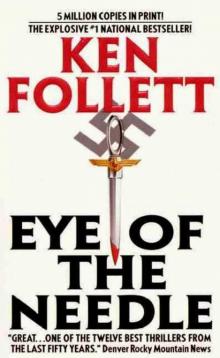 Eye Of The Needle
Eye Of The Needle Lie Down With Lions
Lie Down With Lions Winter of the World
Winter of the World Triple
Triple World Without End
World Without End Fall of Giants
Fall of Giants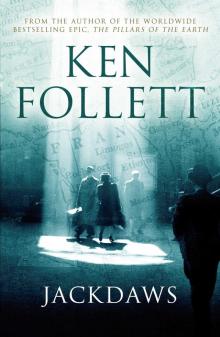 Jackdaws
Jackdaws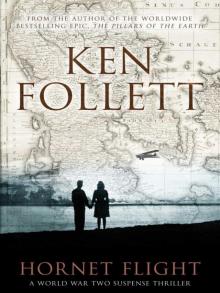 Hornet Flight
Hornet Flight Whiteout
Whiteout A Dangerous Fortune
A Dangerous Fortune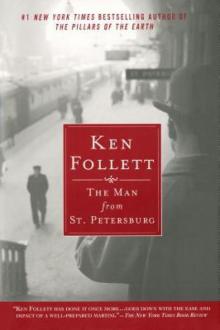 The Man From St. Petersburg
The Man From St. Petersburg A Column of Fire
A Column of Fire The Hammer of Eden
The Hammer of Eden On Wings of Eagles
On Wings of Eagles The Evening and the Morning
The Evening and the Morning The Key to Rebecca
The Key to Rebecca Code to Zero
Code to Zero Paper Money
Paper Money A Place Called Freedom
A Place Called Freedom The Modigliani Scandal
The Modigliani Scandal Triple (1991)
Triple (1991) A Dangerous Fortune (1994)
A Dangerous Fortune (1994)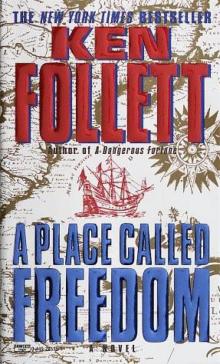 A Place Called Freedom (1995)
A Place Called Freedom (1995) Winter of the World (Century Trilogy 2)
Winter of the World (Century Trilogy 2) Code to Zero (2000)
Code to Zero (2000) On Wings Of Eagles (1990)
On Wings Of Eagles (1990) Storm Island
Storm Island Fall of Giants (The Century Trilogy)
Fall of Giants (The Century Trilogy) the Third Twin (1996)
the Third Twin (1996)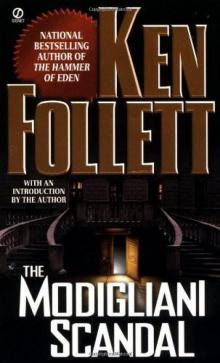 The Modigliani Scandal (1976)
The Modigliani Scandal (1976) Night Over Water
Night Over Water